Natural Sciences
NutriFish wins Fisheries Innovations Award 2023
Published
3 years agoon
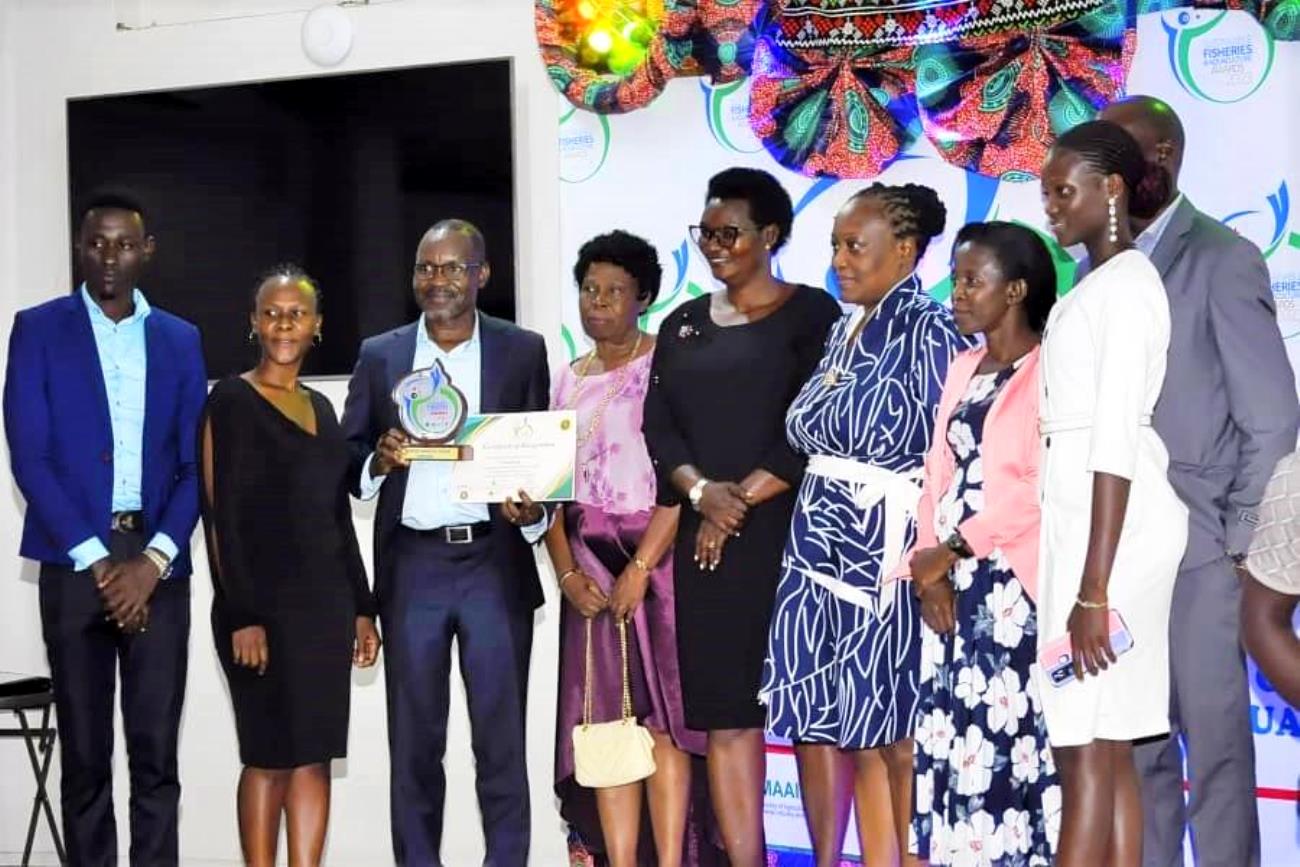
The NutriFish Project under the Department of Zoology, Entomology and Fisheries Sciences, College of Natural Sciences (CoNAS), Makerere University was announced winner of the Fisheries Innovations Award 2023 at the Sustainable Fisheries and Aquaculture Awards (SFA) ceremony held on 30th June 2023 at Fairway Hotel, Kampala.
Organized by the Sustainable Fisheries Initiative (SFI), the Sustainable Fisheries and Aquaculture Awards (SFA) seek to celebrate East Africans (individuals, projects, institutions, and organizations) who devote their time, expertise and passion to a sustainable fisheries and aquaculture sector. Across 15 categories, this annual event celebrates and acknowledges regional champions working in fisheries as well as nature protection, climate action and care for communities while supporting food security and nutrition, sustainable economies, sustainable societies, sustainable environment, gender equity and equality. The SFA Awards look at major categories which include; Best Fisher of the Year, Best Landing Site of the Year, Innovations Award, Blue Heroes Award, Life time Achievers award, Young Fisheries Entrepreneur Award, Sustainable Fisheries Community Award, Green Cities of the future Award, and Women Achievers award.
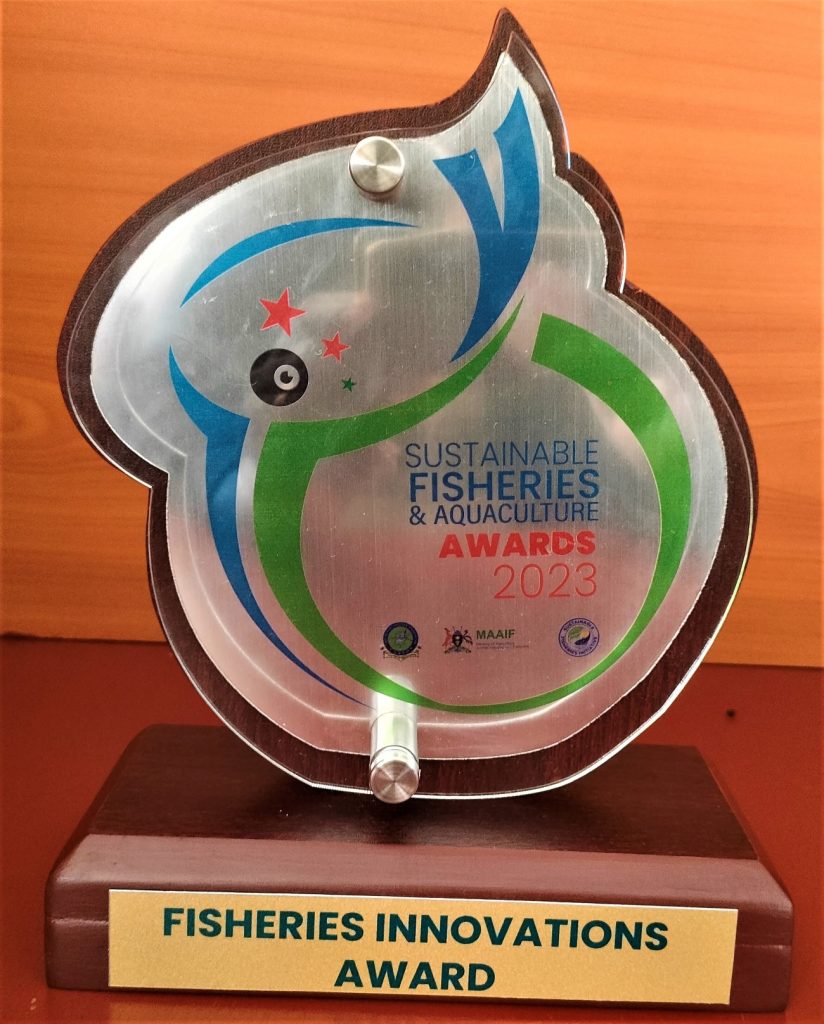
The SFA awards seek to take forward the recommendations from the celebrations of the International Year of Artisanal Fisheries and Aquaculture 2022 that arose from the International Conference on Artisanal Fisheries and Aquaculture (ICAFA) held in September 2022 in Jinja.
The award criteria consisted of three stages: 1) nominations by independent parties; 2) voting for the nominees by the fisheries fraternity which took one month ending on June 20th 2023; and 3) Rigorous evaluation of contributions of the nominees by a committee consisting of Sustainable Fisheries Initiative, the Lake Victoria Fisheries Organisation (LVFO), Ministry of Agriculture, Animal Industry and Fisheries and its agencies.
About the NutriFish Project
Limited access to micronutrient-rich foods and animal protein is a key factor behind nutritional deficiencies in Uganda. It is recommended individuals consume around 25 kg of fish per year; yet, in Uganda, currently only half this amount is consumed – and intake is anticipated to further decline as the population grows.
Supported by the International Development Research Centre (IDRC) and the Australian Centre for International Agricultural Research (ACIAR) through their joint programme, Cultivate Africa’s Future Fund (CultiAF), NutriFish aims to address the nutritional needs of vulnerable groups that cannot afford expensive commercial fish but are in critical need of high quality nutritious diets. The Project is coordinated by Dr Jackson Efitre, Senior Lecturer in the Department of Zoology, Entomology and Fisheries Sciences, CoNAS, Makerere University.
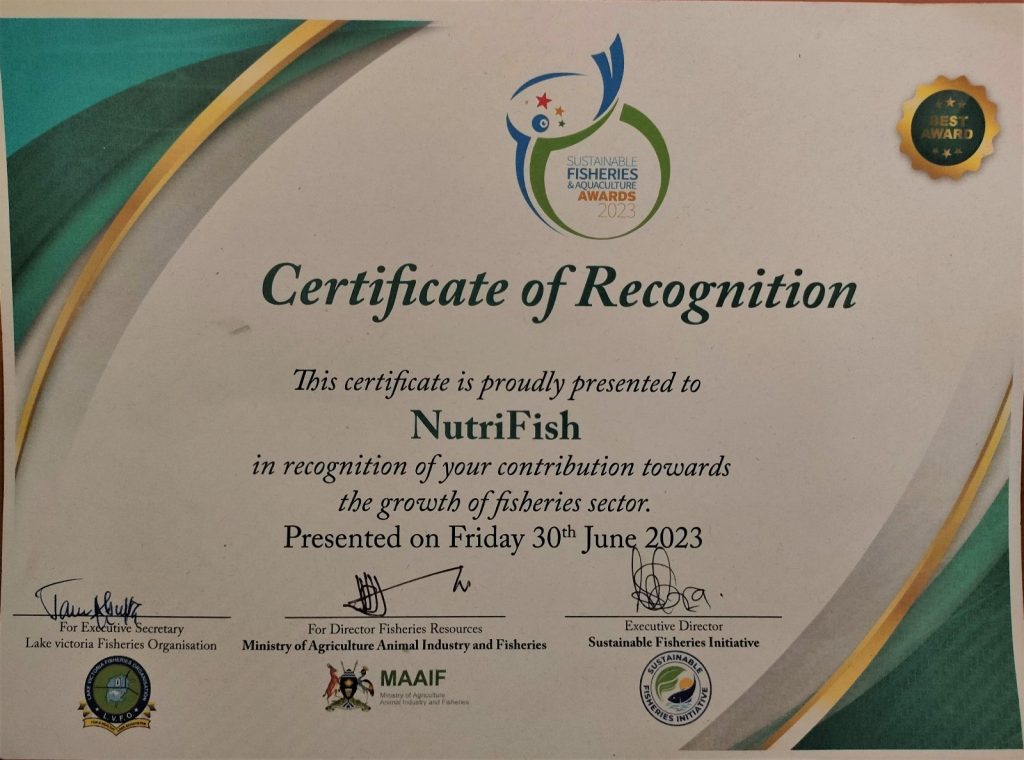
Through the Project, researchers from Makerere University together with their partners from the National Fisheries Resources Research Institute (NaFIRRI) – National Agricultural Research Organization (NARO), NUTREAL Limited and McGill University, Canada in 2019 set out to increase the availability, accessibility and consumption of Small Pelagic Fishes (SPFs) for sustainable food and nutrition security and better livelihoods of vulnerable groups in Uganda. The project has over the years registered significant achievements.
NutriFish Project Achievements
Innovations
- Formulation of fish-enriched foods for vulnerable consumer groups using small silver fish (called ‘Mukene’) and fish by-products.
- Reduction of post-harvest losses by using cost-effective solar tent driers and fish containers with drainage.
- Training ‘champions’ to spread awareness about good handling and processing practices and nutritional value of small fish.
- Development of an app – electronic Catch Assessment Survey (eCAS) – to provide real-time monitoring of fish catches with smartphones.
Key results
- Five high-value nutritious products (baby food, sauce, maize meal, snacks, and seasoning) were developed by NutriFish using Mukene. Containing high levels of key micronutrients (calcium, zinc, iron), Mukene has been used to increase available fish-enriched products to the nutritionally vulnerable and improve diet diversity. A 50g portion of the baby food flour provides more than one-third of a child’s daily protein, iron, zinc, and folic acid requirements.
- Evaluated by 300 street vendors and 60 retailers in Kampala, the sauce garnered positive feedback for being quick to cook, which helps low-income families save time and energy resources. A Mukene recipe book, containing 16 recipes rich in protein, calcium, zinc, and iron, was also developed and endorsed by the Minister of State for Fisheries.
- Fishers have been helped to access loans to purchase boats and fish containers which improve hygiene and quality by improving drainage and reducing compaction of fish. Two enterprise fishing groups with over 70 boats have been established and are working together – an approach which ensures more consistent supply and standards, and results in over 3.7 tons of fish caught each month.
- By September 2022, 8,960 records of catch data had been collected and transmitted through the eCAS system by trained local enumerators. Over 200 stakeholders are using the application, including the Directorate of Fisheries Resources and the Fisheries Protection Unit, which uses the data to help prevent overfishing.
- Solar tent driers – greenhouse-like structures that reduce the risk of contamination – provide clean and efficient storage and drying, especially during the wet season, were also introduced. As well as reduced drudgery for women, the increased fish quality has doubled their incomes, from US$1 to US$2/kg, and tripled the shelf-life of dried small fish to almost five months. The driers have also attracted the attention of policymakers, with the Sectoral Committee of Parliament on Agriculture, Animal Industry, and Fisheries specifically recommending their use in April 2022 for improving fish processing.
- To encourage consumption of Mukene products, NutriFish developed a radio-based awareness campaign. More than 12 million listeners were reached by 29 different ‘spot’ messages in local languages and four 15-minute in-studio conversations – a significant step in tackling long-standing social beliefs that Mukene is a food only eaten by poor families or animals.
- The project also conducted awareness training with 326 people (200 women) to reduce gender inequalities. As a result, domestic violence dropped by 30%, the number of women in the fish value chain increased, more couples began to make joint household decisions, and more men carried out household tasks, increasing from 15% to 20%.
You may like
-
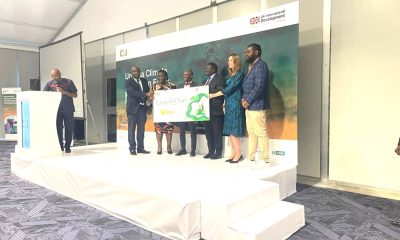

Makerere University Researchers Awarded UCIF Grant to Tackle Maize Contamination with Innovative Plant-Based Fungicide
-


Makerere Graduation Underscores Investment in Africa’s Public Health Capacity
-
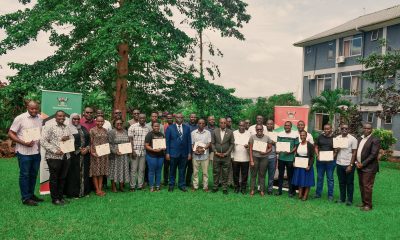

Thirty Public Officers Certified in Integrated Regulatory Cost-Benefit Analysis
-


Botswana Delegation Visits Makerere’s Public Investment Management Centre to Study Sustainable Training Model
-


Makerere’s 76th Graduation Ceremony: CHS showcases research strength with 26 PhD Graduates
-


Mak 76th Graduation Ceremony: CoNAS Presents 16 PhDs & Best Performing Male Student in the Sciences
Natural Sciences
Makerere University Researchers Awarded UCIF Grant to Tackle Maize Contamination with Innovative Plant-Based Fungicide
Published
1 day agoon
March 4, 2026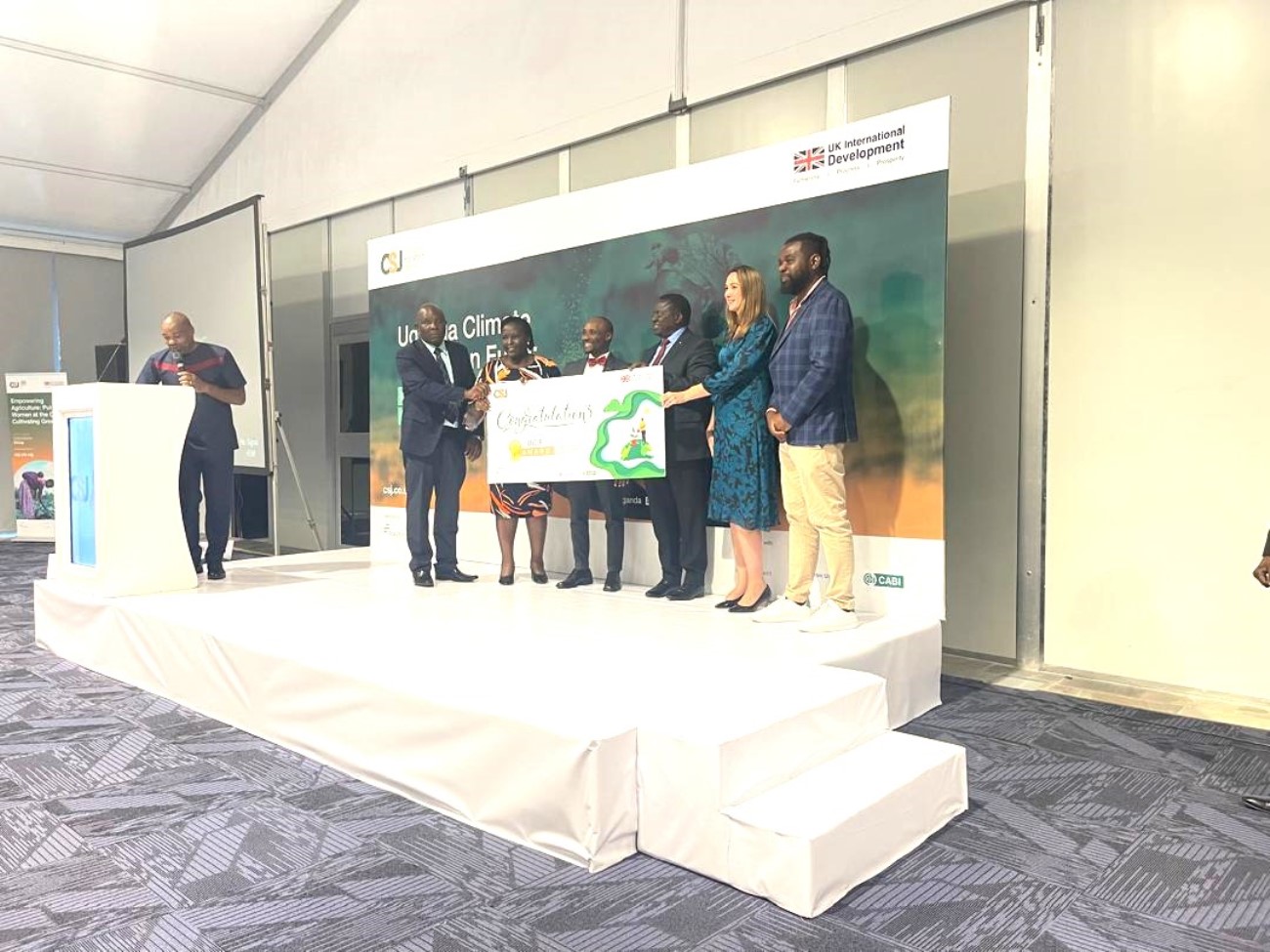
In a significant stride towards ensuring food safety and agricultural resilience, a team of researchers from Makerere University has been awarded the prestigious Uganda Climate Innovation Fund (UCIF) to support the development of a groundbreaking solution to maize contamination.
Maize, a staple food for millions of Ugandans, has long been threatened by Aspergillus fungi, which produce aflatoxins, highly toxic compounds that pose serious risks to human health, livestock, and the nation’s agricultural productivity. Recognizing the urgency of this challenge, the research team from the Department of Plant Sciences, Microbiology, and Biotechnology at the College of Natural Sciences (CoNAS), Makerere University, is pioneering the development of a plant-based organic fungicide aimed at significantly reducing Aspergillus growth and aflatoxin contamination in maize.
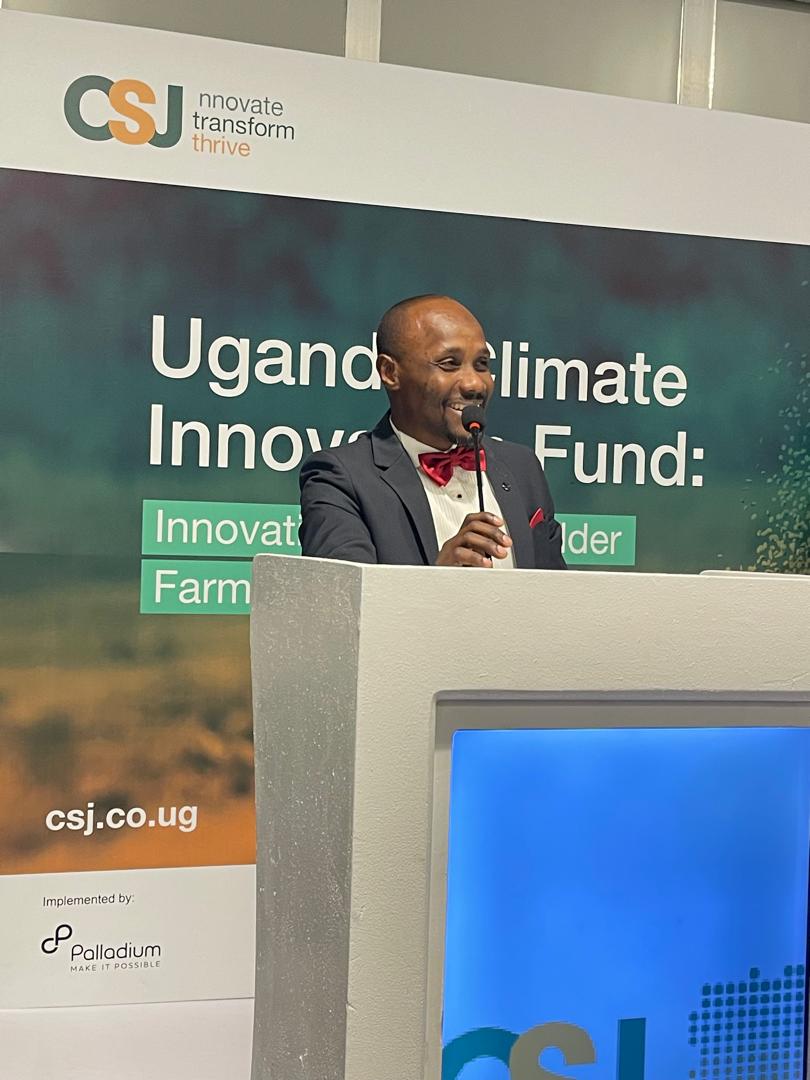
The initiative is spearheaded by Dr. Abubakar Sadik Mustafa (Principal Investigator), with major contributions from co-innovators Dr. Jamilu E. Ssenku, Dr. Patience Tugume, Mr. Frank Kalungi, and Mr. John Okello. The team officially received the UCIF award on 26 February 2026 at an event held at Kampala Serena Hotel.
“This recognition underscores the importance of locally-driven scientific innovation in safeguarding our food systems,” said Dr. Mustafa upon receiving the award. “Our goal is to deliver an environmentally friendly solution that not only protects maize but also contributes to public health and supports sustainable livelihoods for smallholder farmers.”
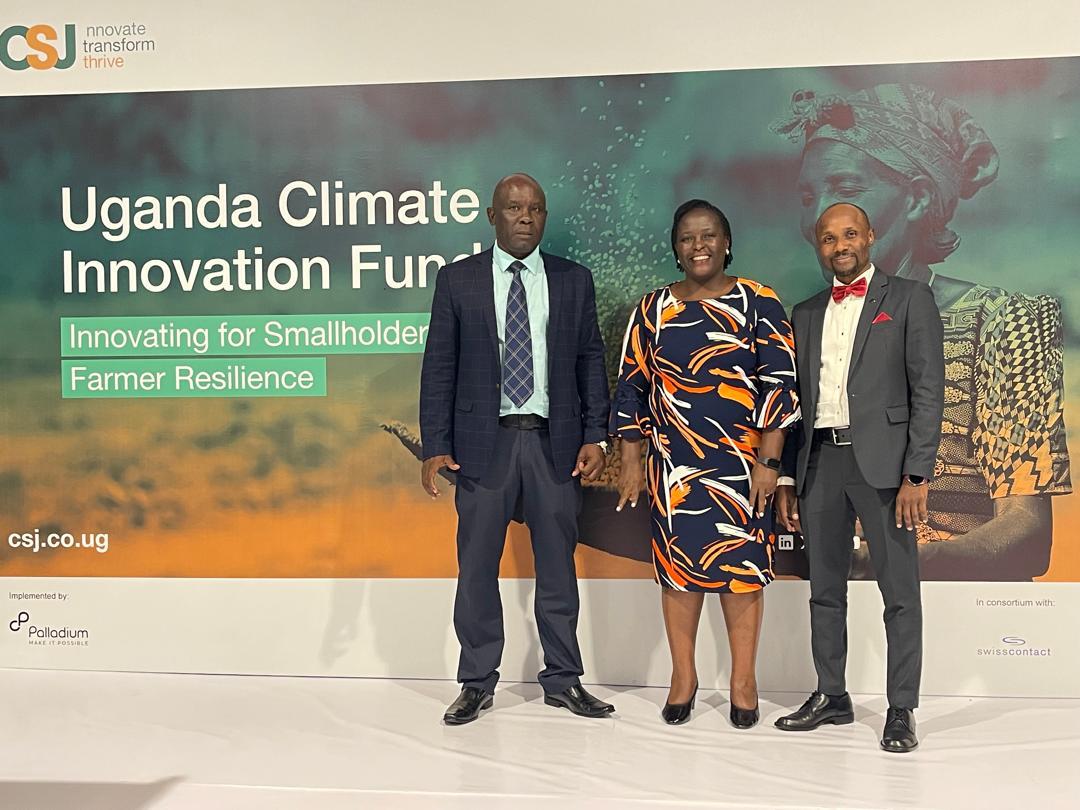
The UCIF grant, funded by the UK Foreign, Commonwealth & Development Office (FCDO) under the Climate Smart Jobs initiative, is implemented by Palladium in collaboration with Stanbic Bank, Swissconnect, and CABI. The programme seeks to advance solutions that address the dual challenges of climate change and economic development by supporting innovations that foster sustainable agricultural practices, reduce environmental risks, and create climate-smart employment opportunities.
This breakthrough aligns closely with the global Sustainable Development Goals (SDGs), particularly those targeting good health and well-being (SDG 3), zero hunger (SDG 2), and climate action (SDG 13). By developing a natural, plant-based fungicide, the Makerere University team hopes to offer a scalable solution that mitigates food contamination risks while promoting environmentally sustainable farming practices across Uganda.
Natural Sciences
Mak 76th Graduation Ceremony: CoNAS Presents 16 PhDs & Best Performing Male Student in the Sciences
Published
1 week agoon
February 25, 2026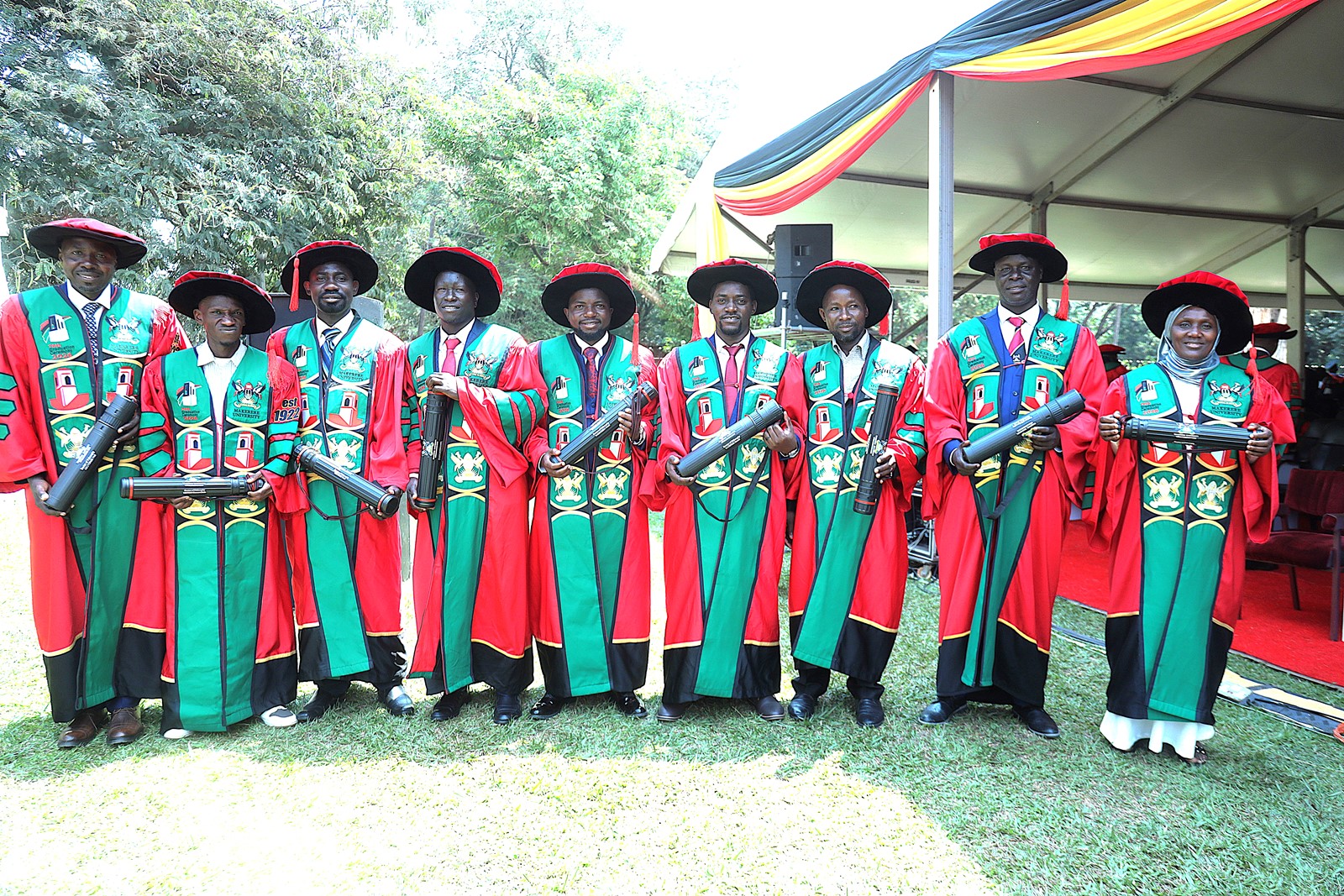
The College of Natural Sciences (CoNAS) presented 269 students for the award of degrees of Makerere University at the 76th graduation ceremony. Of these, 16 graduated with PhDs (4 female and 12 male), 83 with Masters (27 female and 56 male), and 170 with Bachelor’s degrees (45 female and 125 male). The College also presented the Best Performing male student in the sciences. Simon Mungudit graduated with a CGPA of 4.76 in the Bachelor of Science in Petroleum Geoscience and Production. The PhD graduates included; AfazalI Zabibu, a Lecturer at the College of Business and Management Sciences (CoBAMS); Akuyenze Paul, Kawuma Carol, Mutiso Duncan Chalo, Nabiyonga Lydia, and Osinde Cyprian (Plant Sciences, Microbiology and Biotechnology); Batte Hebert, Katende Ronald, and Namugera Frank (Mathematics), Chaciga Jimmy, Tusiime Swaleh, and Komaketch Ignatius (Physics), Kinyua Mbuci, Sekandi Peter, and Shehu Zaccheus (Chemistry), and Nakiyende Herbert (Zoology, Entomology, and Fisheries Sciences).
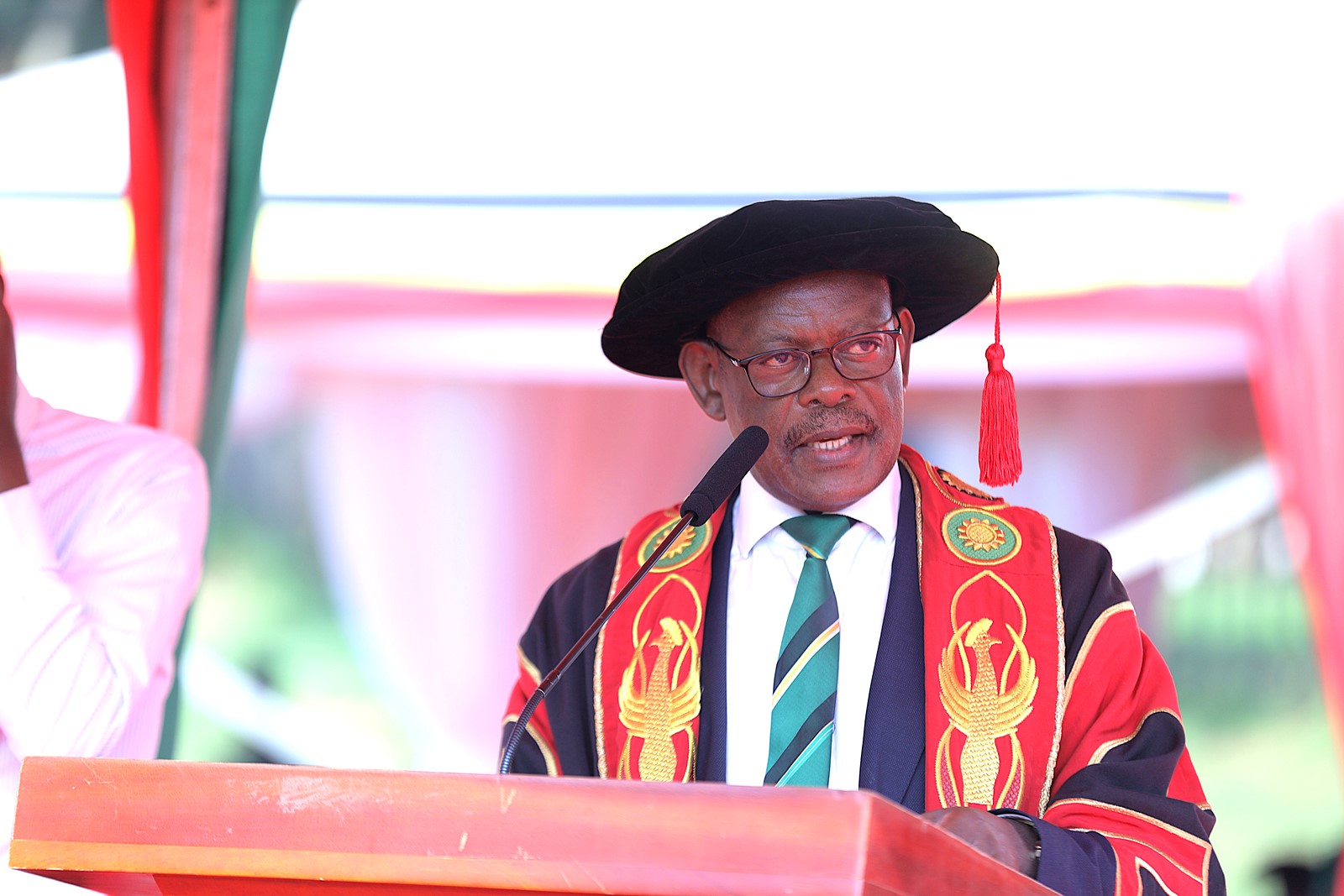
On the second day of the four-day graduation ceremony, which began on 24th February 2026, three colleges presented students for the award of degrees and diplomas of Makerere University. These included CoNAS, the College of Health Sciences (CHS), and the College of Veterinary Medicine, Animal Resources and Biosecurity (COVAB).
Overall graduation Statistics
During the course of the 76th graduation ceremony, a total of 9,295 students will graduate with degrees and diplomas of Makerere University. Of these, 4,262 (46%) are female and 5,033 (54%) are male. A total of 213 students will graduate with PhDs, the highest number in the history of the University. 2,503 will graduate with Masters degrees; 6,343 with Bachelor’s degrees; 206 with postgraduate diplomas, and 30 with Diplomas.
Postgraduates constituted 31.4% of the total number of graduands.
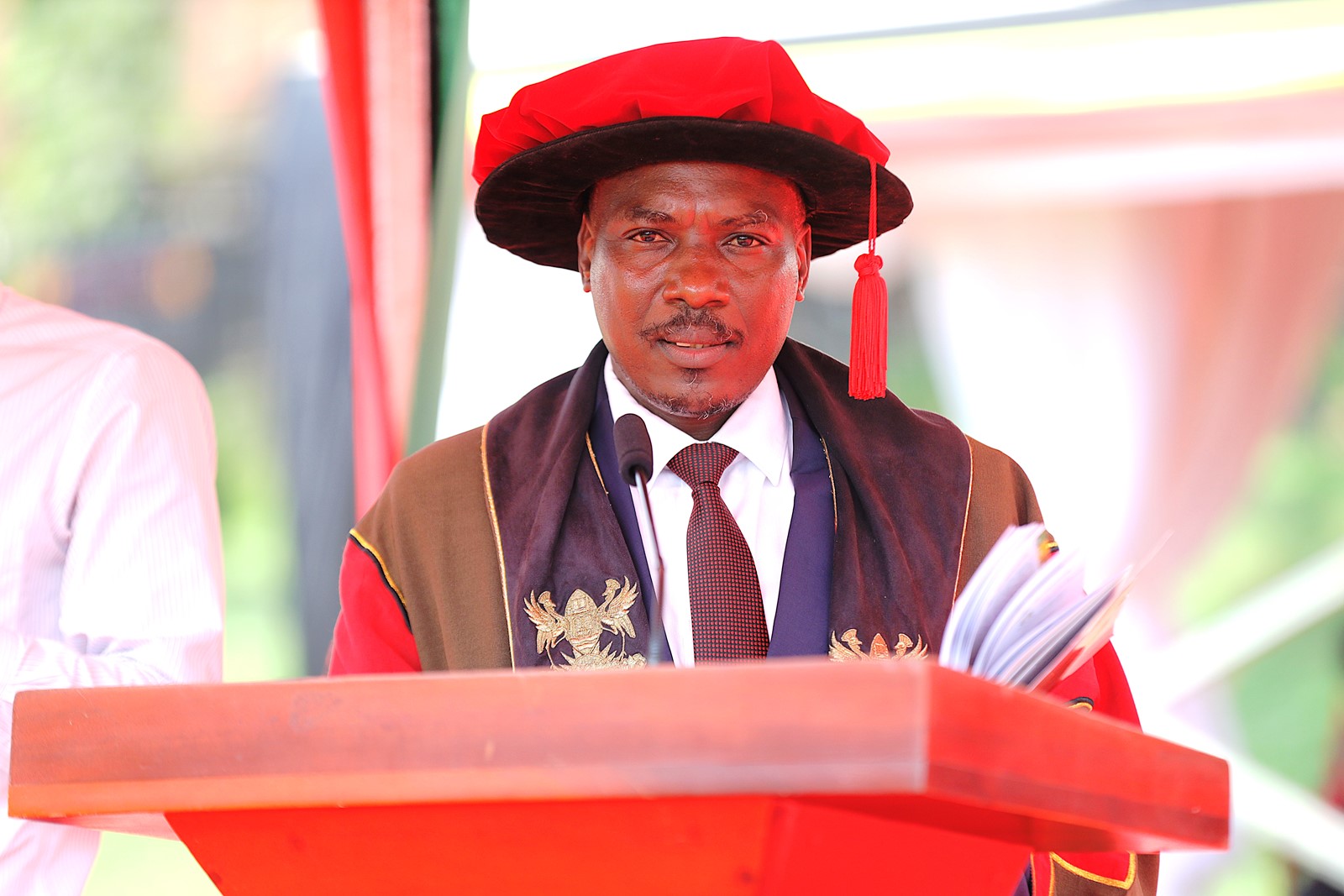
Vice Chancellor’s Remarks
In his remarks, Vice Chancellor Prof. Barnabas Nawangwe commended CoNAS for its transformative research initiatives that are positively impacting communities, highlighting the NutriFishPlus Project, INNOECOFOOD Project, and a project to conserve medicinal plants in Eastern Uganda. Funded by the International Development Research Centre (IDRC) and Australian Centre for International Agricultural Research (ACIAR) under the Cultivate Africa’s Future Fund Phase II, the NutriFishPlus seeks to scale up fish processing technologies and empower fishing communities in Uganda.
The EU-funded INNOECOFOOD Project is transforming food production in Uganda. Through eco-innovative, climate-smart systems, the project aims to improve nutrition, protect the environment, and create jobs- especially for youth and women. Central to this effort are solar- and wind-powered ECOHUBs. These innovative centres use AI and IoT technology to support sustainable fish farming, monitor water quality, reduce losses, and increase yields.
Meanwhile, researchers from the Department of Plant Sciences, Microbiology, and Biotechnology, under the leadership of Dr. Patience Tugume, are spearheading efforts to conserve medicinal plants in Namutumba District. To date, 174 plant species have been documented, with ongoing assessments of threats from unsustainable harvesting. These plants play a vital role in treating malaria, diabetes, hypertension, and certain cancers.
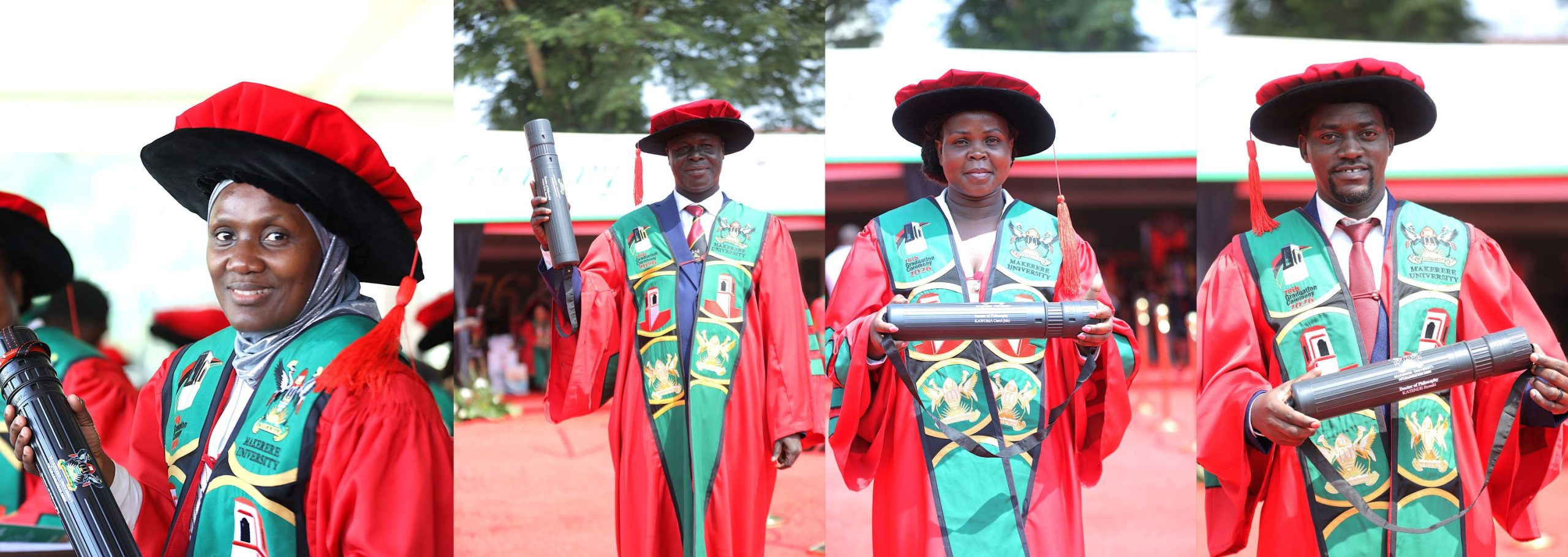
Efforts to Transform Makerere into a Research-led University
In his address, the Vice Chancellor reaffirmed the University Management’s commitment to transforming Makerere into a research-led institution. He expressed gratitude to the Government of Uganda for securing a USD 162 million loan from the Korea Exim Bank to support critical infrastructure development at the University. The funding will facilitate the construction of new facilities for the School of Medicine, School of Dentistry, School of Engineering, the Science and Technology Centre, and the completion of the School of Computing and Information Sciences- an unprecedented development in the University’s history.
The Vice Chancellor further highlighted the pivotal role of the Makerere University Technology and Innovations Centre (MUTIC) in advancing incubation and commercialization. “The Centre offers mentorship, business development training, intellectual property support, and industry linkages to help transform research outputs into viable enterprises.” To date, eleven spin-off companies have been established by students and staff, while the University’s Innovation Pod (UniPod) has incubated more than 100 projects in the past year. The short-term target is to establish 50 spin-off companies annually, with plans to double that number in the long term.
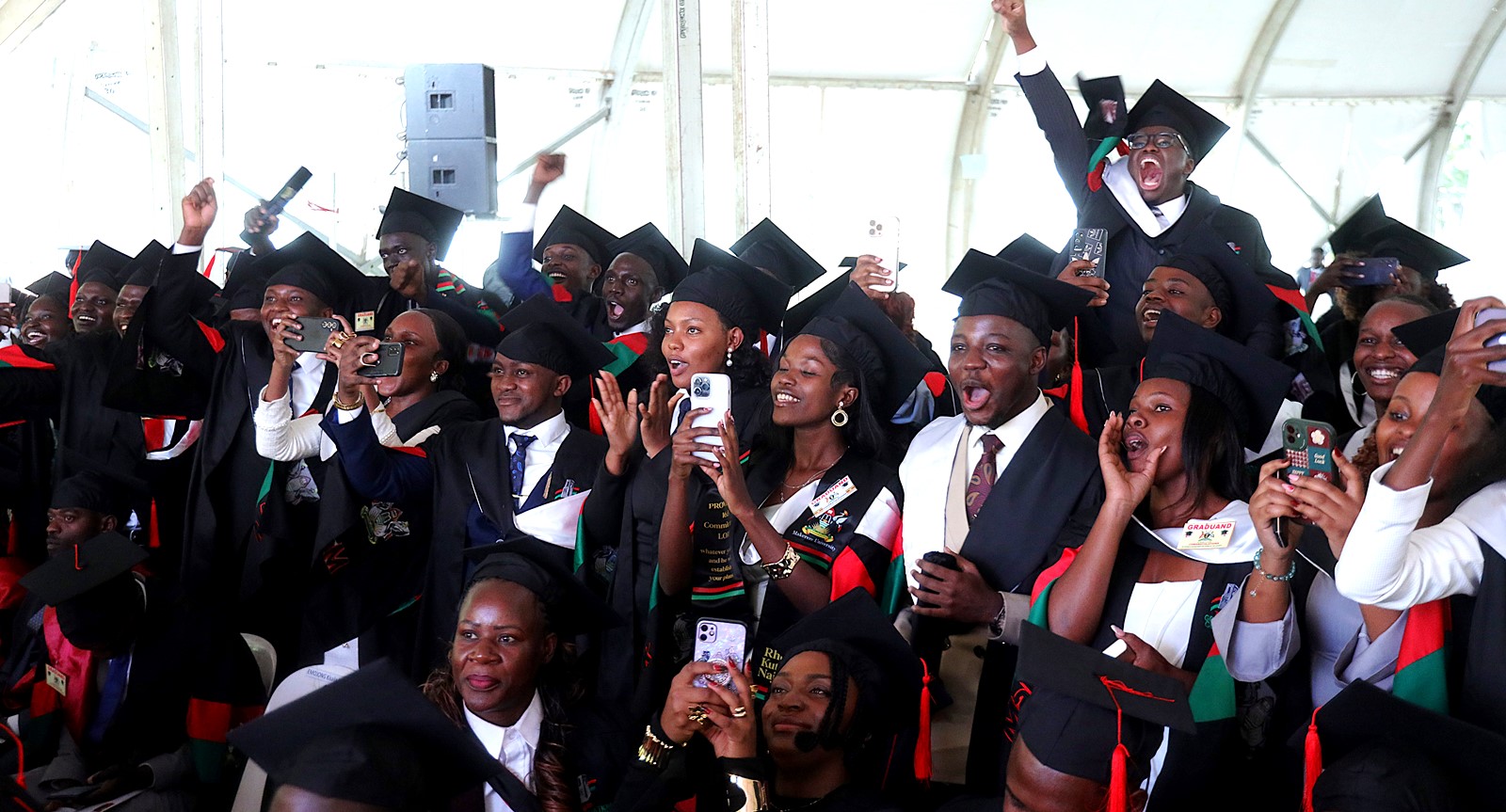
Prof. Nawangwe acknowledged the government’s contribution through the Makerere University Research and Innovations Fund (MakRIF). Through this initiative, the government has supported over 1,400 high-impact research and innovation projects, and facilitated the training of more than 200 PhD students.
In partnership with the Science, Technology and Innovation Secretariat in the Office of the President, the University has also introduced awards to recognize outstanding researchers and innovators. These include the Research Excellence and Innovation Commercialization Awards. “The Innovation Commercialization Award underscores the institution’s commitment to translating research into practical products, services, and technologies that address real-world challenges and support national development,” the Vice Chancellor noted.
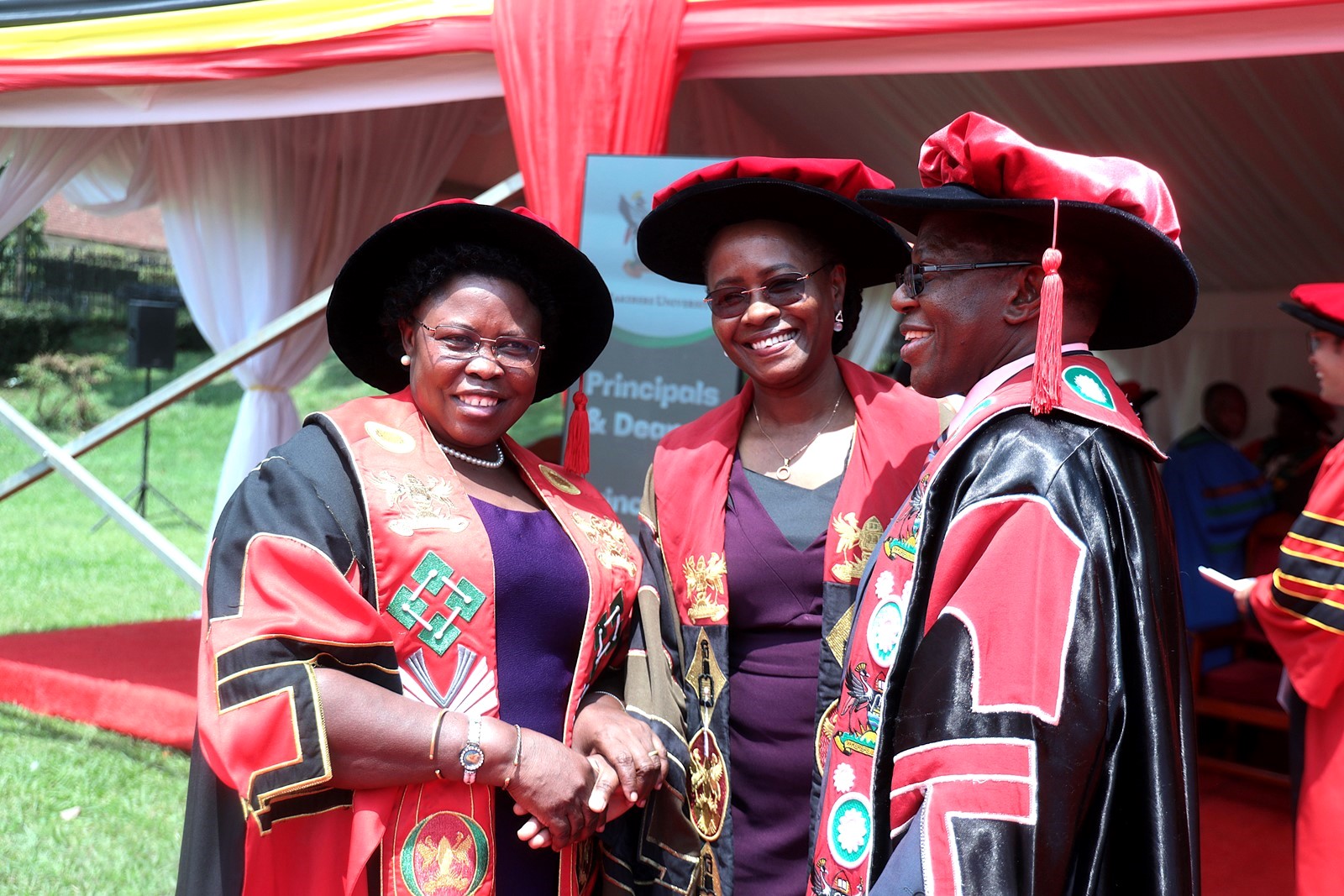
Vice Chancellor’s Message to the graduates and Appreciation to the Partners
The Vice Chancellor urged the graduates to uphold dignity, humility and diligence as they leave the gates of Makerere University, and begin the next chapter of their lives. “As you step out of the gates of Makerere, remain proud of your alma mater and serve as good ambassadors wherever you go. Use the knowledge acquired from one of the world’s leading universities to improve yourselves, your families, communities, country, and humanity at large.”
He equally appreciated the parents and guardians for supporting the students, and the development partners who have extended research funding to the university over the years. These include the Mastercard Foundation, the European Union, NORAD, Sida, IDRC, KOICA, DAAD, NIH, CDC, USAID, the Wellcome Trust, KfW, IUCEA, RUFORUM, ARUA, the PLUS Alliance, WUN, AAUN, AAP, the Madhvani Foundation, and the Government of Uganda through the Higher Education Students Financing Board. “We are equally grateful to the Embassy of China, the Chinese Chamber of Commerce, various Government Ministries, State House, private sector players, and many other partners whose generous support continues to advance our mission.”
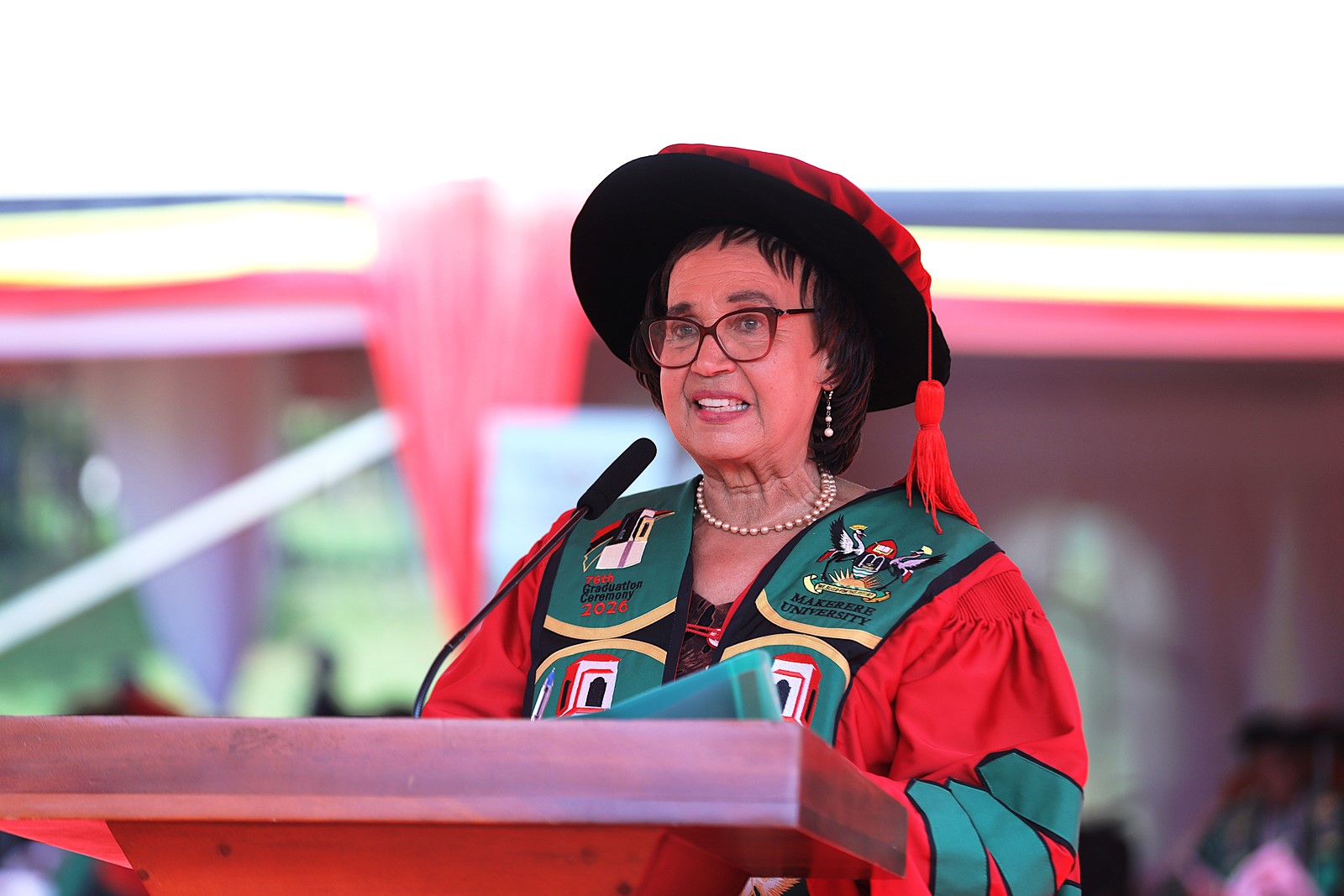
Remarks by the Chancellor
Makerere University Chancellor, Hon. Dr. Crispus Kiyonga congratulated the graduands on their achievement and commended the staff, parents, and partners for their invaluable support. He expressed gratitude to the Government for its steadfast commitment to advancing research through the annual UGX30 billion allocation to the Makerere University Research and Innovations Fund.
He underscored the University’s contribution to Uganda’s Fourth National Development Plan (NDP IV) through advancements in science, technology, and innovation, and encouraged graduates to embrace entrepreneurship amidst an increasingly competitive job market. He further called for enhanced research funding, stronger private sector collaboration, and deeper community engagement to accelerate national development.
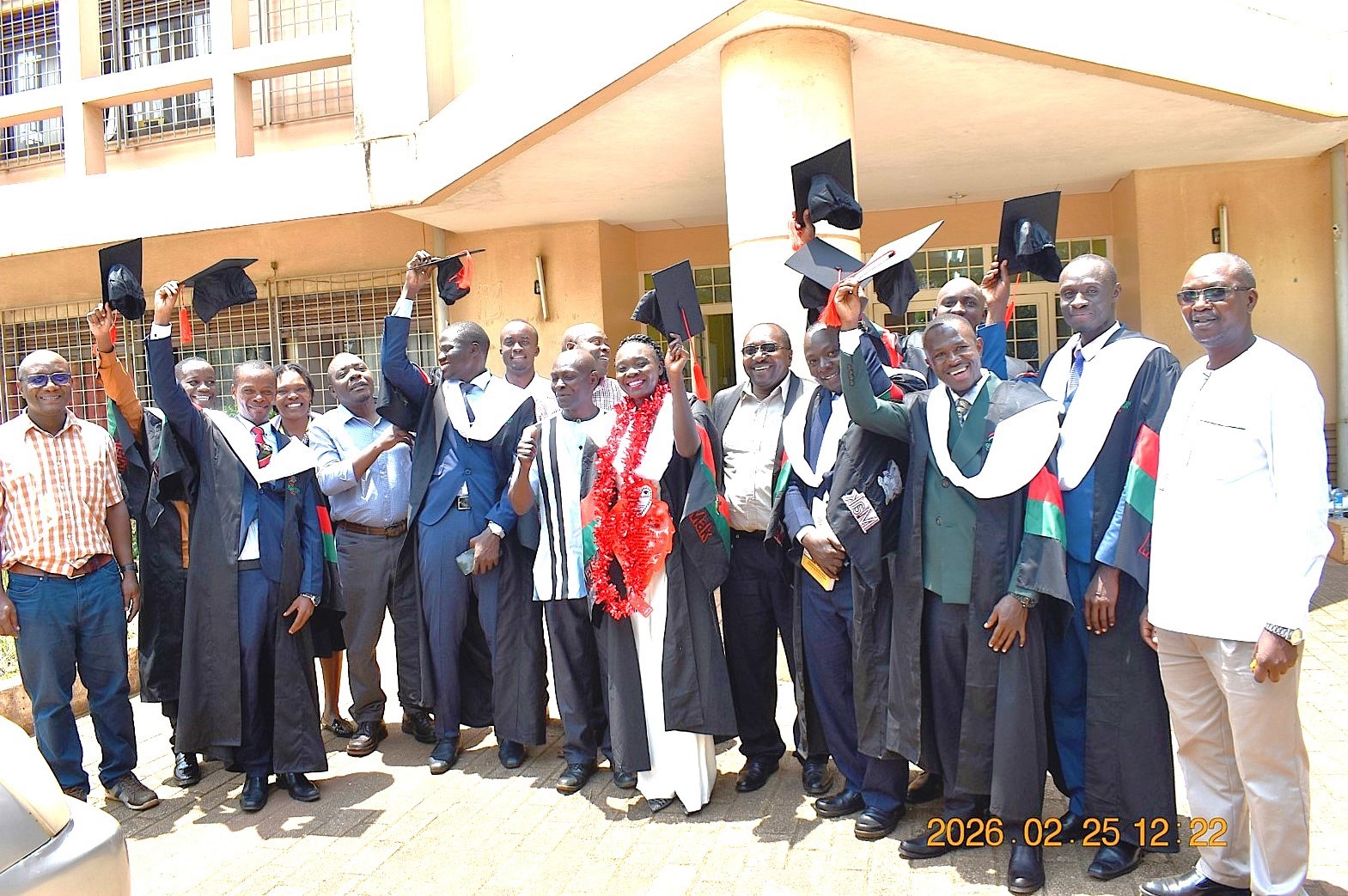
The Minister of Education and Sports
In her remarks, the Minister of Education and Sports, Hon. Janet Kataaha Museveni, represented by the Minister of State for Primary Education, Hon. Dr. Joyce Moriku Kaducu commended Makerere University for its pivotal role in driving national development. She highlighted the University’s contribution to knowledge generation and societal transformation. “The impressive number of PhD graduates this time round is testimony to the robust research output and academic excellence.” The Minister emphasized the importance of maintaining and enhancing academic standards, urging the University Administration to rigorously implement and uphold quality assurance measures that guarantee continued excellence of its programmes and global competitiveness of its graduates.
Implementing the Competence-based Education and Training
The Minister reiterated a key directive for all institutions of higher learning to prepare for the full implementation of Competence-Based Education and Training by July 2027. “This reform represents more than a policy shift. It signals a fundamental transformation in how graduates are prepared, with greater emphasis on practical skills, innovation, and problem-solving.” She urged the Vice Chancellor and his team to lead in curriculum reform, staff development, and infrastructure enhancement to ensure the successful rollout of competence-based education.
The Minister further urged the university management to ensure that all satellite campuses are fully accredited and that their programmes meet the same standards and relevance as those offered at the main campus.
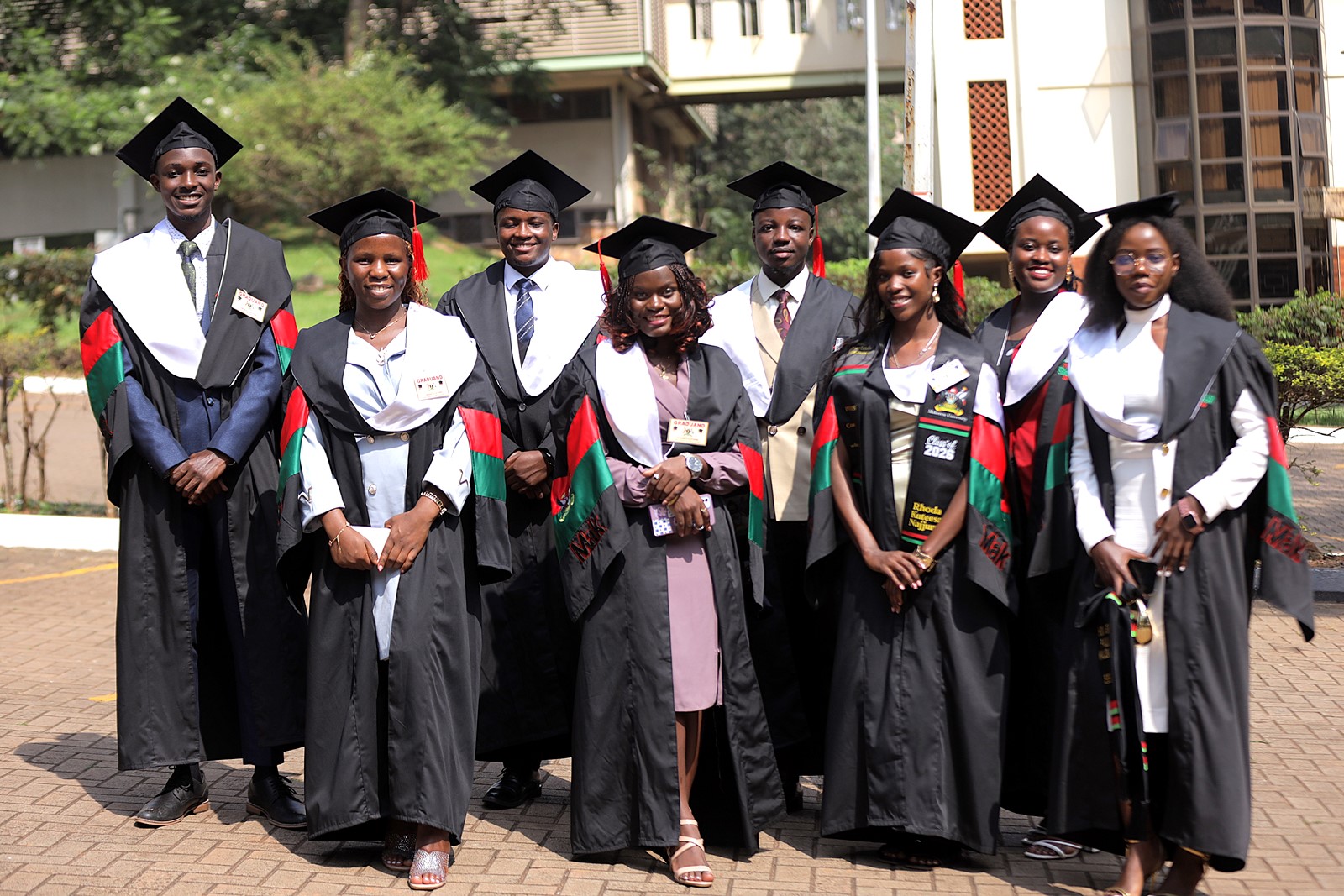
Commencement Lecture by Dr. Maggie Kigozi
At the ceremony, distinguished alumnus, and Chair of the Makerere University Endowment Fund, Dr. Maggie Kigozi delivered a compelling commencement lecture, reflecting on her journey since earning her first degree in 1976. She shared three guiding messages for the new alumni as they embark on their professional paths.
Dr. Kigozi emphasized that power comes with responsibility, urging graduates entering the health and life sciences to combine their expertise with ethical leadership and financial literacy to create sustainable, compassionate practices. She highlighted the global opportunities that a Makerere degree offers, explaining how her education empowered her to make meaningful contributions across Uganda, Kenya, and Zambia.
She also encouraged the graduates to view failure as a stepping stone to excellence, noting that mistakes are not setbacks, but lessons. She underscored the importance of balance, reminding graduates to manage their personal and professional responsibilities realistically.
Research Excellence Awards
During the graduation ceremony, Makerere University recognized the top researchers and innovators from the 10 Colleges. At CoNAS, Mr. Omara Timothy from the Department of Chemistry scooped the Overall Top Research and Early Career Researcher Awards, whereas Dr Godwin Anywar from the Department of Plant Sciences, Microbiology, and Biotechnology won the Mid-Career Researcher Award.

More about Simon Mungudit, the best performing male science student – https://cns.mak.ac.ug/simon-mungudit-maks-best-male-science-student-this-year-rising-star-in-petroleum-geoscience/
Natural Sciences
BOKU University Charts New Collaboration Strategies with Mak’s Department of Zoology, Entomology & Fisheries Sciences
Published
3 weeks agoon
February 12, 2026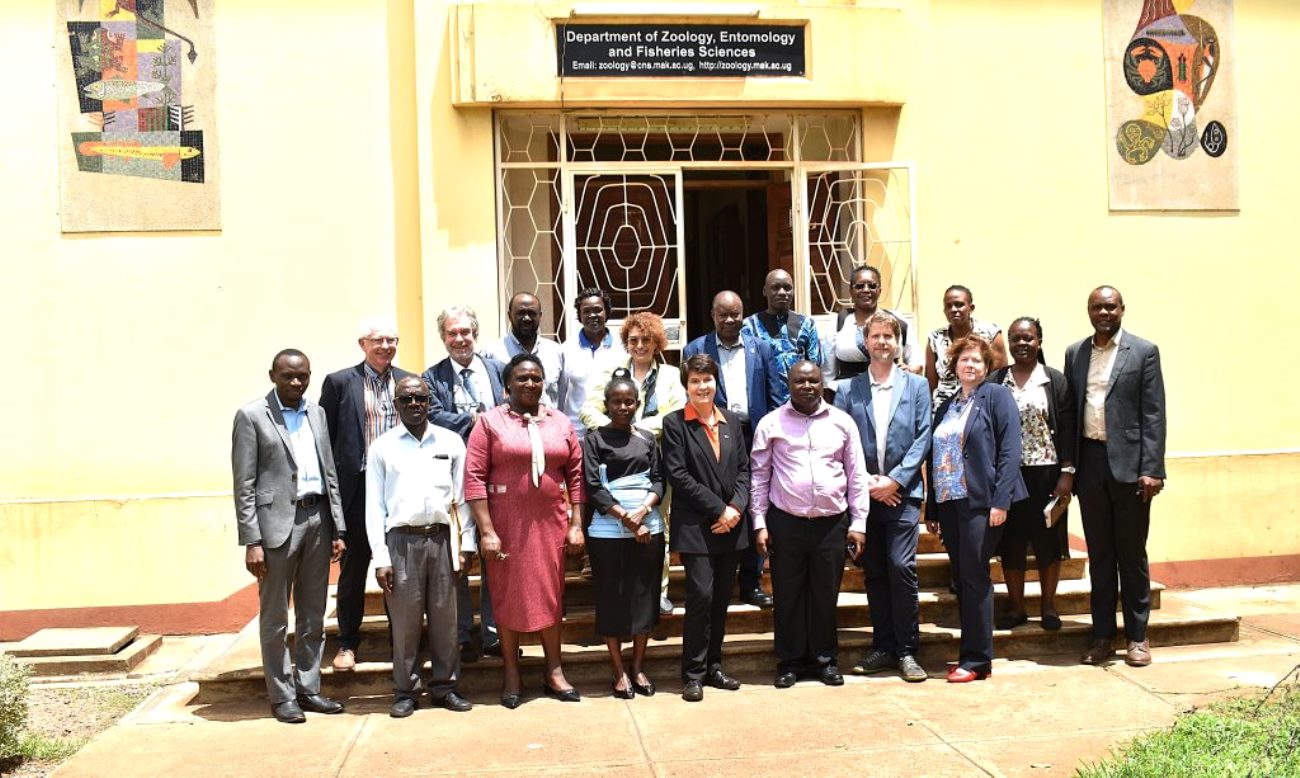
The Department of Zoology, Entomology and Fisheries Sciences at Makerere University on 11th February 2026 hosted a high-level delegation from the University of Natural Resources and Life Sciences, Vienna (BOKU), to discuss strategies for future collaboration in a partnership that has spanned five decades.
The meeting followed the BOKU team’s participation in the opening ceremony of the Promotion of Hybrid Renewable Energy Systems towards Electricity Access in Uganda project, an initiative designed to expand access to decentralized renewable energy solutions. The project, implemented under CEDAT, is funded by the Austrian Partnership Programme in Higher Education and Research for Development (APPEAR), a programme of the Austrian Development Cooperation administered by OeAD.
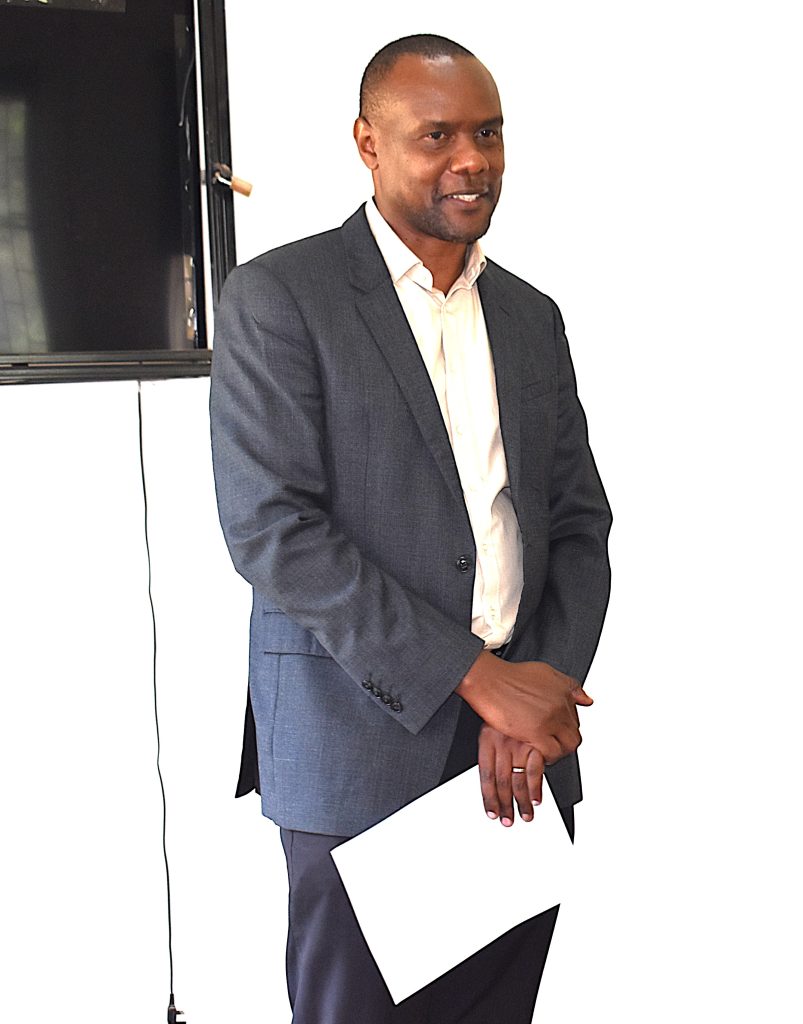
Discussions at the Department of Zoology, Entomology and Fisheries Sciences focused on deepening and broadening a historic collaboration that has shaped aquatic sciences, fisheries research, and environmental management in East Africa for half a century.
A Partnership Rooted in Limnology
The collaboration between Makerere University and BOKU traces its origins to 1975 with the establishment of the International Post-Graduate Course in Limnology (IPGL) by the late Heinz Löffler (1927-2006). The eight-month UNESCO-supported course, hosted in Lunz, Mondsee and Vienna, was designed to train scientists from developing countries in limnology – the study of inland waters.
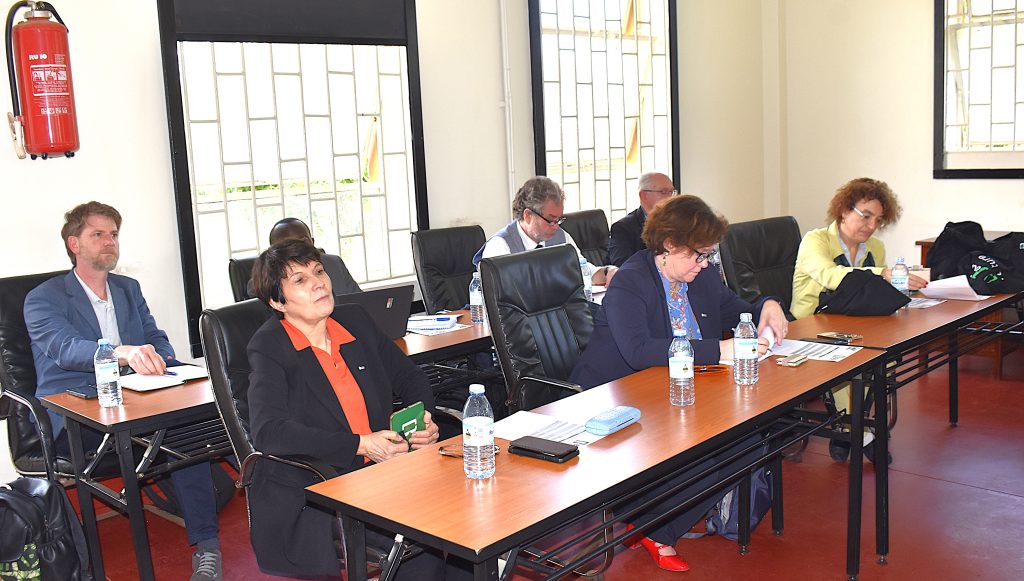
In 1976, Dr. Gwahaba James Joshua of Makerere’s Department of Zoology, Entomology and Fisheries Sciences became the first beneficiary from the university. Two years later, Boniface Makanga attended the UNESCO course and went on to initiate a Marine Practical Course to the Indian Ocean in 1993. That programme has since grown into over 30 years of annual field activity in Mombasa, benefiting undergraduate and master’s students and strengthening hands-on marine science training at Makerere.
Over time, IPGL evolved into a vibrant International Joint Degree Master’s Programme in Limnology and Wetland Management. The programme has built capacity for 123 aquatic professionals – 56 female and 67 male, including 20 from Makerere University. Notably, 11 dedicated limnologists are currently based within the Department of Zoology, Entomology and Fisheries Sciences, a testament to sustained capacity development.
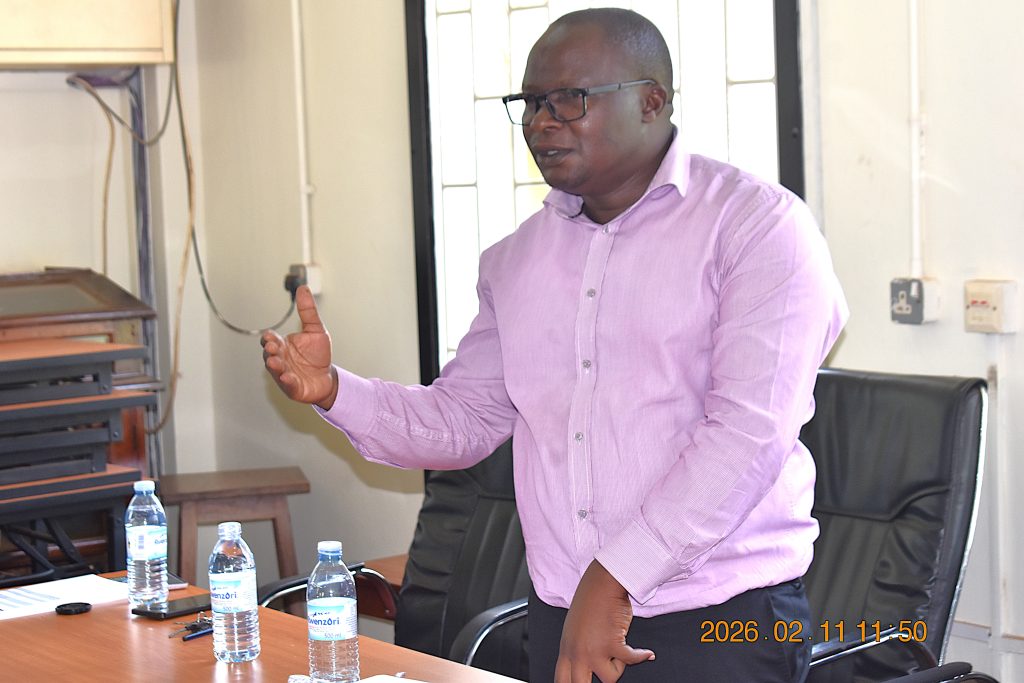
Expanding into Fisheries, Aquaculture and Regional Networks
The Mak-BOKU collaboration progressively expanded beyond limnology into fisheries, aquaculture, and broader freshwater ecosystem management.
Among the key initiatives was STRECAFISH (2015-2018), which focused on strengthening regional capacity in fisheries and aquaculture research and training to improve food security and livelihoods in Eastern Africa. The programme adopted a modular approach, trained 28 MSc students, supported five full PhDs and 11 MSc research projects, and facilitated 14 staff exchanges.
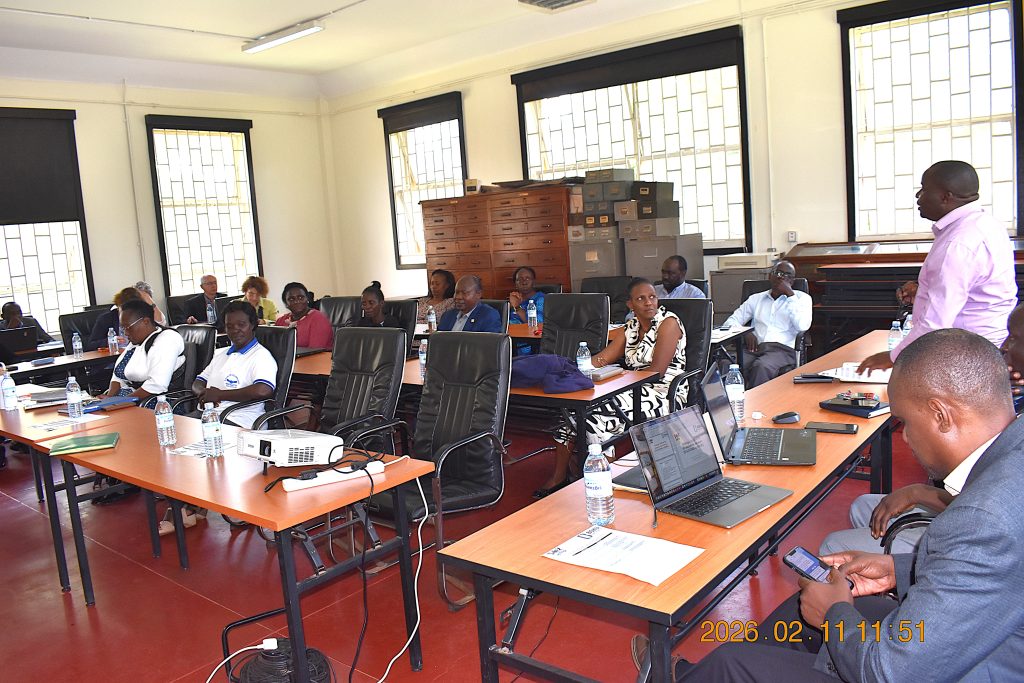
This momentum continued under COTRA (Collaborative Training in Fisheries and Aquaculture in East, Central and Southern Africa) from 2017 to 2023. COTRA enhanced staff and student mobility, supporting 24 master’s students (six credit-seeking and 18 degree-seeking), 12 doctoral candidates (four credit-seeking and eight degree-seeking), and 10 faculty and administrative staff. The initiative emphasized fit-for-purpose PhD training in aquaculture and fisheries to address food security challenges in Sub-Saharan Africa under the ACP-EU Cooperation Programme in Higher Education (EDULINK II), in partnership with institutions such as Lilongwe University of Agriculture and Natural Resources.
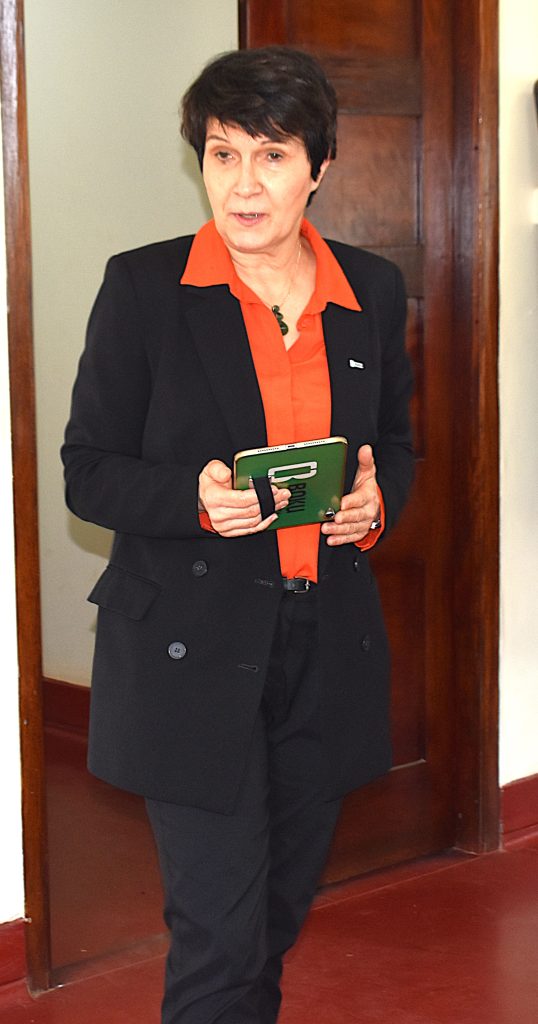
Ongoing collaborations include the Erasmus+ KA1 Learning Mobility of Individuals programme (2021-2027), which connects BOKU and Makerere with Egerton University, Kyambogo University, Addis Ababa University, Bahir Dar University and others. Additional joint initiatives include:
FreshNet: A higher education and research network for sustainable management of freshwater ecosystems in Eastern Africa, involving BOKU, Egerton University, Addis Ababa University, Bahir Dar University, EIAR and IHE Delft.
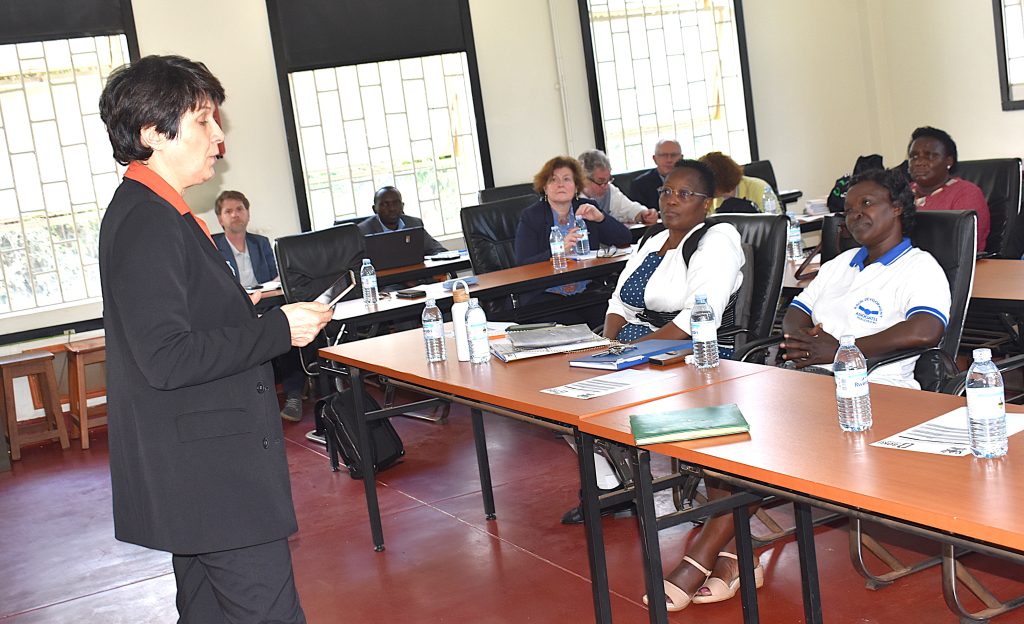
SWAQ-Uganda (2021-2026): Sustainable water quality management supporting Uganda’s development ambitions, implemented with IIASA, BOKU and Uganda’s Ministry of Water and Environment.
BIOGOLD (2024–2027): A project on biosorption for sustainable small-scale gold mining in Uganda, involving Kyambogo University, Makerere University, Gulu University, the University for Continuing Education and the University of Pretoria.
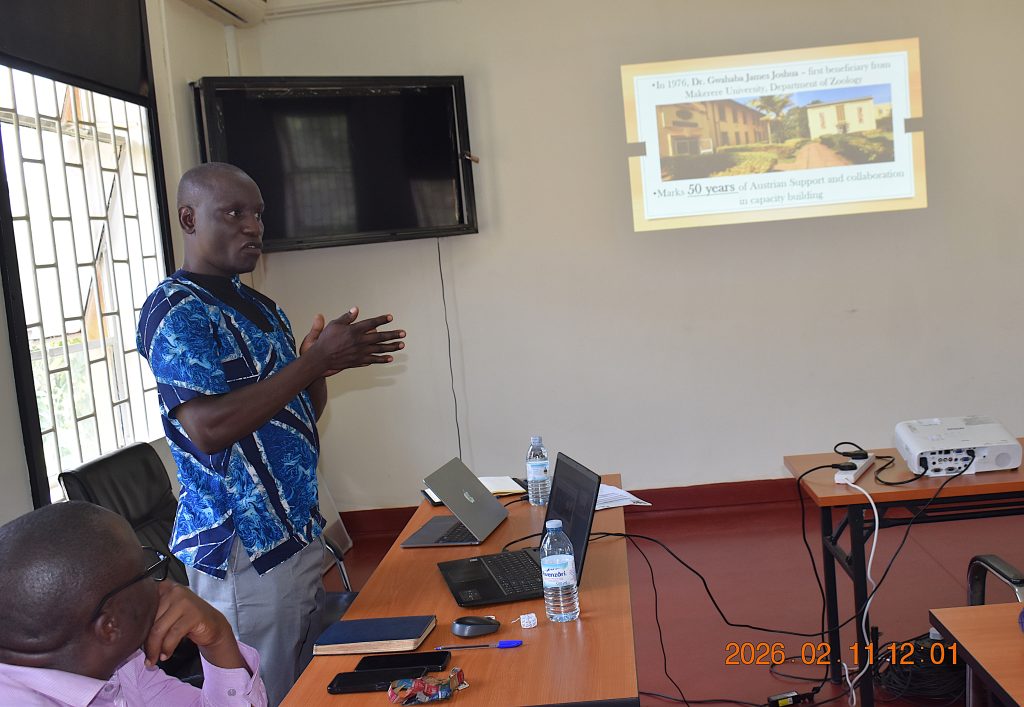
Collectively, these initiatives underscore a 50-year-old partnership that has built critical human resources at MSc and PhD levels in aquatic ecosystem management, conservation and utilization. The collaboration has also facilitated acquisition of essential research equipment, strengthened administrative capacity in project management, and nurtured a culture of knowledge sharing and innovation.
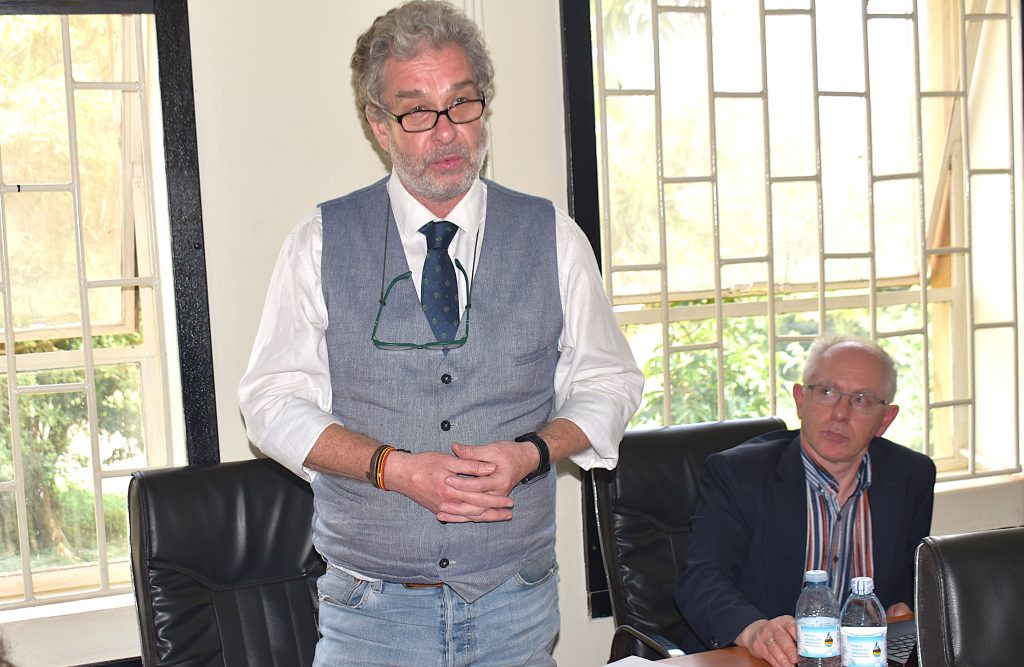
Meeting with the BOKU delegation
The BOKU delegation was led by the Rector, Prof. Eva Schulev-Steindl, a specialist in environmental law, and Vice Rector Assoc. Prof. Doris Damyanovic, an expert in landscape planning. They were accompanied by:
- Mag. Gerold Winkler, Coordinator of the Applied Limnology / Limnology and Wetland Master’s programme;
- Dr. Mathew Herrnegger, BOKU’s Africa Cooperation Country Coordinator and hydrology specialist; and
- Dr. Andreas Melcher, Africa-Uninet Coordinator from BOKU’s Institute for Development Research.
During the discussions with departmental staff, Dr. Akoll presented a detailed account of the partnership’s evolution and achievements, emphasizing its transformative impact on regional training and research capacity.
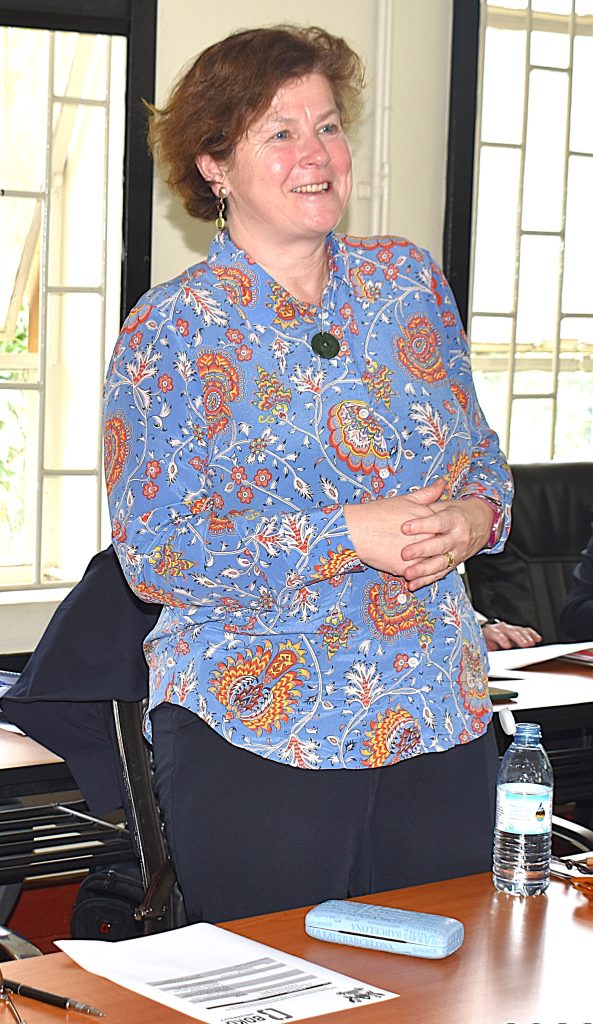
Charting the Next Chapter
As the partnership enters its sixth decade, both institutions are keen to expand into new frontiers. Key areas identified for future collaboration include:
- Enhanced staff and student exchanges;
- Joint research projects and co-publications;
- Introduction of short courses at the Makerere University Biological Field Station, Kibale beyond wildlife studies;
- Research on climate change and its effects on marine and freshwater resources;
- Advancement of basic biological research; and
- Strengthening fisheries research and innovation.
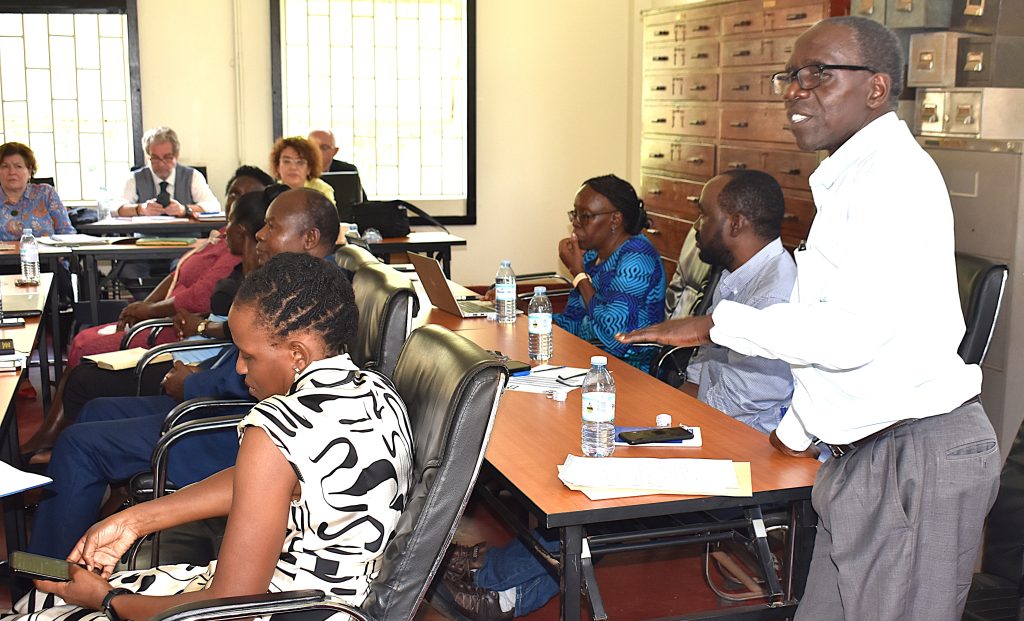
In his remarks, the Head of the Department of Zoology, Entomology and Fisheries Sciences, Dr. Godfrey Kawooya expressed gratitude for the enduring partnership, noting that it has significantly strengthened regional training capacity and supported the education of numerous Makerere staff and students. He added that the collaboration reinforces Makerere’s standing as one of the most collaborative universities globally and aligns closely with its research agenda.
Rector Schulev-Steindl reaffirmed BOKU’s commitment to advancing the longstanding relationship, describing it as a model of North-South academic cooperation built on mutual respect, shared knowledge and tangible impact.
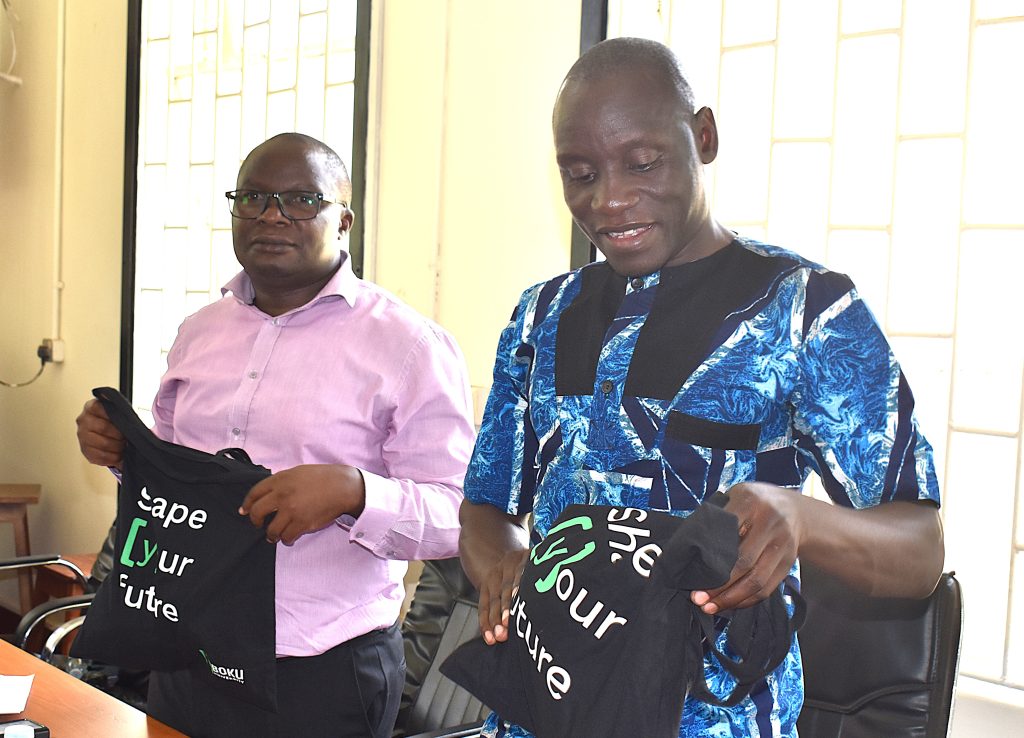
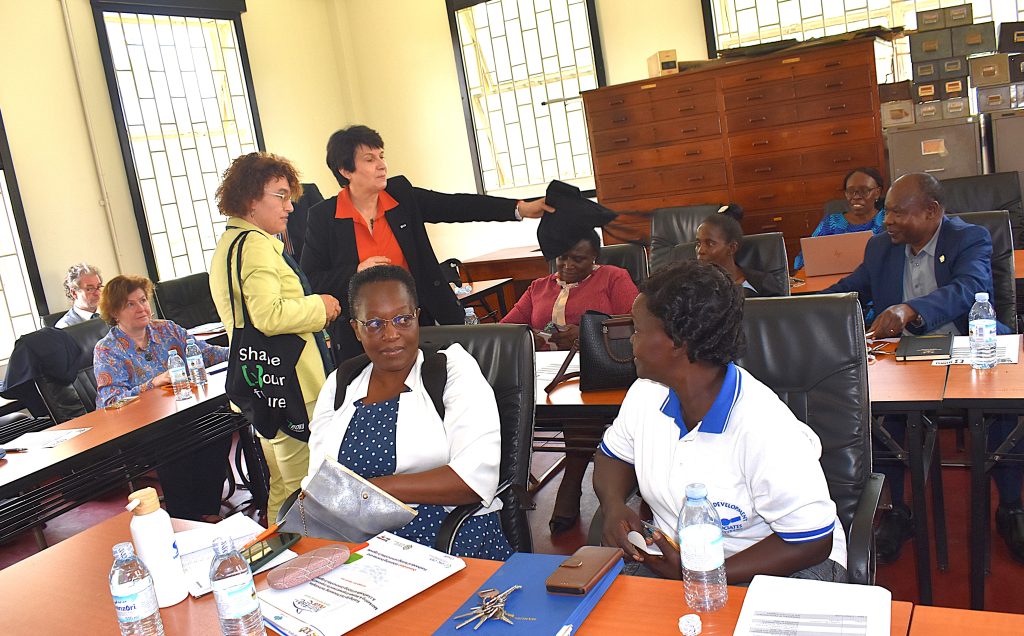
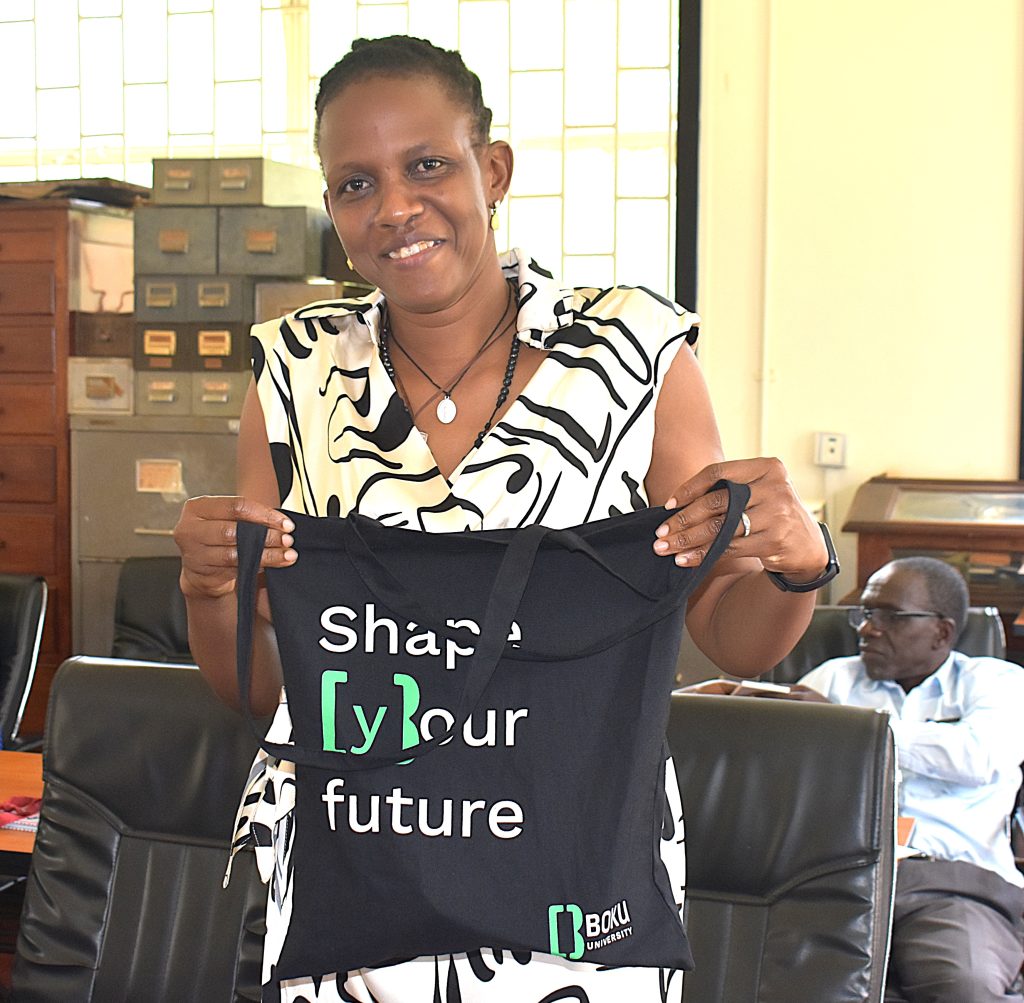
Event pictorial: https://drive.google.com/drive/folders/1HkCCZf_TCPV0V7_ZR2PSVEw1zrEGhZeJ?usp=sharing
Trending
-

 General17 hours ago
General17 hours agoCall for Applications: Diploma Holders under Government Sponsorship 2026/2027
-

 General16 hours ago
General16 hours agoAdvert: Admissions for Diploma/Degree Holders under Private Sponsorship 2026/27
-

 Humanities & Social Sciences2 weeks ago
Humanities & Social Sciences2 weeks agoMeet Najjuka Whitney, The Girl Who Missed Law and Found Her Voice
-

 General1 week ago
General1 week ago76th Graduation Highlights
-

 Agriculture & Environment2 weeks ago
Agriculture & Environment2 weeks agoUganda Martyrs Namugongo Students Turn Organic Waste into Soap in an Innovative School Project on Sustainable Waste Management
